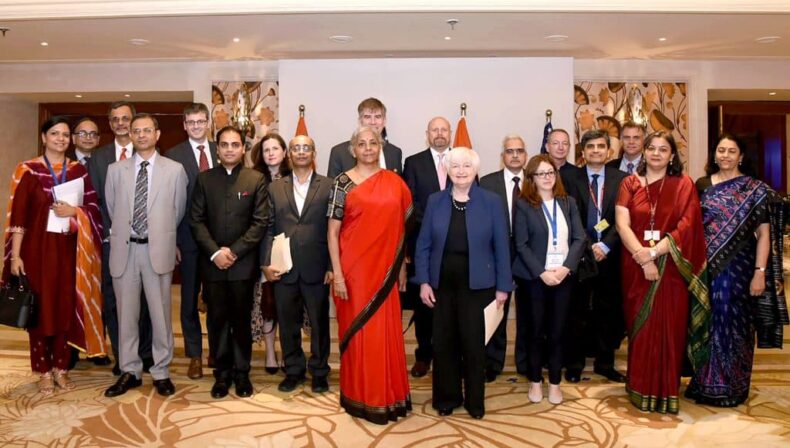India’s Finance Minister Nirmala Sitharaman said on Friday that the India-US relations have developed into a global strategic partnership through 50+ bilateral dialogue mechanisms, and their cooperation is broad-based and multi-sectoral.
Addressing the India US Business and Economic Opportunities Session Event on the sidelines of the 9th Economic and Financial Partnership (EFP) meet, Ms. Sitharaman highlighted the mutual understanding between both countries and welcomed various historic opportunities for collaboration in the field of economic activity, business relations and evolving bilateral defense trade.
Emphasizing how India’s efforts need to be seen as a brightly amid global economic gloom and nurturing India-US ties, India’s finance minister spoke confidently to Janet Yellen, US Treasury Secretary, who led the US delegation this time. .

Tracing India’s growth trajectory amidst geopolitical instability and a sharper-than-expected world economic slowdown, Ms Nirmala also listed the gathering the various reform measures taken by the Indian government to chart the path of Atmanirbhar Bharat.
The Finance Minister reflected on the success of foreign investment regulations and called upon the stalwarts from business and prominent thought leaders to participate and contribute to India’s growth story with a vision of shared prosperity between India and the US.
Recently, Sitharaman held bilateral discussions with Yellen during the 9th EFP, which was also attended by Economic Affairs Secretary Ajay Seth, RBI Governor Shaktikanta Das, Chief Economic Adviser V. Anantha Nageswaran, and US Federal Reserve Chairman Jerome Powell, who was present through video conferencing.
Yellen and Sitharaman led the 9th Economic and Financial Partnership (EFP) meeting where the two parties discussed issues of mutual interest including climate finance, multilateral issues, taxation, supply chain resilience, India-US Cooperation at G20, and global economic developments.

Janet Yellen on Friday in New Delhi said that the US will pursue the ‘friend-shoring’ approach, which is to deepen economic integration with trusted trading partners like India to diversify supply chains beyond China.
Yellen, the Biden administration’s top economic leader established concerns about the U.S.A during moments of intense global economic uncertainty. The US wants India to be at the center of America’s orbit of economic allies as soaring food and energy prices stemming from Russia’s war and America’s reliance on Chinese goods have pushed the US to help in reshaping the global economic order and stability.
An example of India and US joint integration in the technological sector is Microsoft’s growing operations in India. Yellen noted that America’s development finance agency was supplying a US solar manufacturer with 500 million dollars in financing to build a facility in the south Indian state of Tamil Nadu. Yellen also emphasized on Apple’s recent switch to move iPhone manufacturing from China to India.
Read More: https://tdznkwjt9mxt6p1p8657.cleaver.live/russia-accuses-west-of-militarizing-southeast-asia/
India maintains strong diplomatic ties with Russia, which has become its top supplier of oil. On the other side of the spectrum, India positively wants to make itself an international production hub for U.S. companies because as a trading partner, US makes up the largest volume of goods trade in India-US economic history in 2021 and India would want to continue such endeavors in the future.

Yellen also said that the US monetary agencies are actively working towards the need for a global regulation of cryptocurrencies, which India has been pressing for.
However, given the trade trajectories and unfolding of complex dialogues, India-US relations are not unhindered by ebbs and flows. Given India’s tilt towards protectionism, lack of infrastructure, and tight regulations, the actual future transformation remains hazy.
Moreover, India needs to develop the size of the domestic consumer market to match international levels like that of China. India also declined to join negotiations over the trade pillar with the World Trade Organization and the Indo-Pacific Economic Framework for Prosperity. India’s stance on Russia has been closely monitored by various sides, especially the West. Ever since the Russia-Ukraine war began, India as the second most populous country has been advancing its trade ties with Russia in terms of oil, energy, and munitions imports.
According to Eswar Prasad, a trade policy professor at Cornell University and a former official of the International Monetary Fund, India has deep-seated economic interests in maintaining a reliable and relatively cheap supply of oil from Russia. While India’s ties with Russia and China are seen as diplomatic, it would for in India’s favor to balance its multilateral relations with other countries including USA and EU nations.













